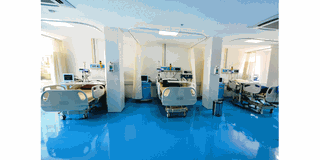Start-ups relieving pressure on govt’s cash-strapped healthcare system - experts

A ward at UMC Victoria Hospital, a private health facility in Kampala. PHOTO/FILE/COURTESY
What you need to know:
- The ministry of health data shows that the country has significant funding shortfalls, amounting to $390 million in the current fiscal year, and are projected to hit $900 million in the 2025/26 financial year.
New technologies are saving Uganda’s cash-strapped health care systems strained by chronic underfunding, high rates of maternal and infant mortality, poor infrastructure, and poorly trained medical personnel, experts have said.
“Not only is the tech-evolved healthcare system more convenient for patients, but it has also provided greater efficiencies for healthcare providers,” Jide Olanrewaju, a Business Unit Partner at asset manager TPG and its Evercare Health Fund told International Finance Corporation (IFC), the World Bank’s private sector lending and advisory arm.
“Access is really just the first step – technology is helping us go further by bridging the gap between access and convenience. [It is also] reducing costs through telemedicine, digital medical devices, and mobile technology,” he added on Monday.
Uganda still faces a high prevalence of deadly diseases like tuberculosis, HIV/AIDS and malaria, which further burdens its healthcare system, according to the World Health Organisation (WHO).
Additionally, Uganda's healthcare system is severely underfunded, making it challenging to provide its population with high-quality medical care in the face of terrific shortages of medical personnel, supplies, and prescription drugs, as well as of hospitals, health centres, and related machinery.
Anthony Ssebageraka, a research fellow at Makerere University School of Public Health, states that urgent access to high-quality, reasonably priced healthcare products is necessary due to the disproportionately high prevalence of treatable and preventable health conditions in the country.
HEPS Uganda, a health research organization, conducted a survey in 12 sampled districts where the country’s health ministry has the most programming and budgeting.
The results showed that, in contrast to HIV/AIDS prevention services that are mostly funded by the US government, most health facilities offered fewer services for cancer treatment and vaccination, as well as for hepatitis.
Ssebageraka, the lead researcher, observed that in many medical facilities, access was hampered by shortages and stock outs of vital health supplies that at times was exacerbated by their costs.
The ministry of health data shows that the country has significant funding shortfalls, amounting to $390 million in the current fiscal year, and are projected to hit $900 million in the 2025/26 financial year.
During the same period, the Ugandan government is projected to increase its commitment to this need from 12 percent, or $140.4 million, to 34 percent, or $170.9 million.
However, this is still insufficient, and the majority of these funding gaps have affected commodities related to nutrition, neglected tropical diseases, oxygen equipment, and anemia, according to global health experts.
The country can only provide $17.2 million of the $156.7 million total procurement need for laboratory diagnostics commodities in the current financial year.
In addition, the total amount of health aid, $94.9 million, still leaves a 45 percent increase in the funding gap that amounts to $42 million if the US President's Emergency Plan for AIDS Relief (PEPFAR) and the Global Fund's commitments, are taken into account.
“This is due to the introduction of more effective but expensive testing technologies, an increase in program targets to increase service coverage, and the scaling up of specialized services at high-level institutions,” said Dr Seru Morris, the Commissioner of Pharmaceutical Services and Natural Medicines at Uganda's Ministry of Health.
The World Bank now says in a statement that this healthcare crisis can be solved by the private sector through mass adoption of innovation by various health startups, which has worked in many emerging markets.
Uganda has garnered many of them. Some include Breast IT – a pocket size AI powered ultrasound and photo acoustic breast cancer probe and clinicPesa ltd – a mobile money savings, micro-loan and payment solution for healthcare,
Majority of these startups are focused on mobile health applications. Others are focusing on wearables, telehealth, electronic health records (EHRs), and artificial intelligence.
These apps allow users to conveniently track health data like blood pressure, weight, and activity levels. They also let users set up appointment reminders, remember when to take their medications, and perform other tasks related to their health.
One significant benefit is the increase in access to care, which has long been a barrier for the populace because of severely underpaid medical professionals, a shortage of medical professionals, inadequate supplies of medications and necessary equipment in government facilities, a lack of hospital beds, excessive costs, and poor accessibility to health services, especially in rural areas, per an Afrobarometer survey conducted in 2021.




